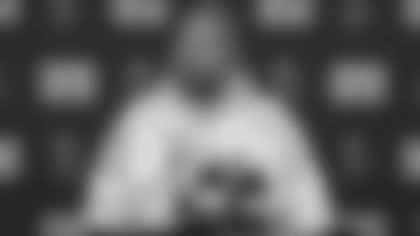Head Coach Brian Daboll
Q: First off, the injuries. There's been a few reports that (tight end) Daniel Bellinger is going to need eye surgery and (tackle) Evan Neal with the MCL. Can you go over them and of course (guard) Ben Bredeson too?
A: Bellinger's got an eye and Bredeson and Neal have knees.
Q: Will Bellinger need surgery on the eye?
A: Yeah, I think so. Yeah.
Q: Yesterday, you said about (quarterback) Daniel Jones – you said he's cool as a cucumber. It seems as like you have a coordinator up in the booth that's the same way, a guy that sticks with something that works and sticks with a running play that maybe isn't working early in game. Can you talk about (offensive coordinator) Mike (Kafka) up in the booth and his personality and how you two guys are communicating during the game?
A: Yeah, I think Mike has done a fantastic job since he's been here. He's very smart. He has good leadership qualities. I think he communicates well with Daniel (Jones), specifically the quarterback but really with all the players. I think he works extremely hard at his craft during the week to get prepared for a game. Throughout the game, he's very calm, he's very composed. I think he does a great job communicating with the assistant coaches who do a good job of giving feedback to him. That's important when you're a coordinator to get that information from the assistants that are watching their positions or their matchups if you will. They do a good job collaborating and I think Mike stays the course. He has these first seven games of doing what he thinks we need to do to win offensively. I communicate with Mike throughout the game but again, I let Mike do his job. I think he's done a great job.
Q: Bredeson, does it look like it's serious or?
A: No. We'll go week-by-week with him.
Q: Just one more on Daniel (Bellinger). I know this is not your expertise on eye surgery.
A: That would be a correct statement.
Q: You saw how bad (Bellinger) looked. Can they tell about his vision yet and is the surgery to repair the fracture and since it's so swollen, is there concern about his vision or are they pretty okay with that at this point?
A: I couldn't tell you 100 percent. I think they'll do the surgery, I'm optimistic. But in terms of getting into details with it, I couldn't answer those.
Q: I just have something about (safety) Landon Collins who got a bunch of snaps yesterday, made a tackle on his first play. First of all, how do you think he played in his first game for you?
A: I think he did a good job. He's a pro. Obviously, he's played a lot of football. We got him acclimated to how we do things here, he picked up our defense well and I thought he did a good job.
Q: Did you have any reservations - he's a new player for you, but he's not a new player for the Giants – about bringing him back to where he was sort of a star? Did you talk to people in the building about how that might fit in, the guys who've been here before?
A: No, we just looked at him when he worked out. You always talk to people that know the player that you're bringing in. Thought he'd be a good addition and he's been.
Q: I'm curious how much of an asset for you as a play-caller is it when you have a quarterback who can be a threat with his legs like Daniel (Jones) is?
A: Based on who your quarterback is, that's really when you sit down and start talking about the offense and how you want to build it. He's the primary player that you talk about and then it goes on. Everybody is important but when you have a quarterback who can – the dual-threat quarterbacks, as they say nowadays, add another element to your offense because it is 11 on 11 football. Those guys can carry the football or zone read it or do some different things. So, he has the ability to do those things. How many times we use him each game – I think that varies based on how we are getting played. Yesterday, he was a big-time asset for us.
Q: I wanted to ask about (center) Nick Gates. I know that the deadline is coming up on him. What's the plan with him?
A: We'll see. We'll talk about it here in the next couple days. Nick's done a good job since he's been out here working out. We'll revisit that here tonight.
Q: What'd you make of the way the two backup offensive linemen (Josh Ezeudu and Tyre Phillips) played once you got to see them on film? Is that the way you'll go moving forward?
A: Yeah, I think they both did a good job. They were prepared and that's a credit to them, first and foremost, but then (offensive line coach) Bobby (Johnson) and (assistant offensive line coach) Tony (Sparano Jr.) spend a lot of extra time with some of those younger guys or guys that are working on the practice squad. They were both ready to go and prepared and did a good job. We'll work with them this week and we'll see how it goes this week but I was pleased with how they responded with having to go in there and play.
Q: On Bellinger, do you expect him back this year?
A: It's probably too early to say when I expect him back. We'll see how this thing goes and I'm hopeful for it but obviously you never know when things like this happen.
Q: I wanted to ask one about (running back) Saquon (Barkley). He was a little hard on himself yesterday with his early runs. I think he said they were soft and his mind wasn't in the right place. What did you see from him early on and how was he able to find that play late in the fourth quarter?
A: That's what you love about Saquon is he's never satisfied. I'm happy he's on our team. We could have blocked plays better, too. I think he's a very good leader for us. He obviously owns some of the things that happened but I would say it's more of a collective effort than just Saquon Barkley, he did a good job for us.
Q: Can you talk a little bit about the job (cornerback) Fabian Moreau has been doing for you?
A: I said I think last week - he's come in, he's learned our defense. I think he's playing some good football. I know the coaches have confidence in him, the players around him I think have confidence in him and he's playing good, smart football for us.
Q: After every game as a coach, do you send a letter to the league saying, "These are the calls that were made. I have issues with this one, I don't have issues with anything else?"
A: Yeah, we have good communication with the league office. Each week, that happens. Those conversations will be between myself and the league. You're always trying to figure out ways you can coach things better.
Q: If you could clarify what Evan's injury is?
A: It's a knee.
Q: How long will he be out? Do you have any idea?
A: No.
Q: (Wide receiver) Wan'Dale (Robinson), he was the most targeted of your wide receivers. What are you seeing from him and how he was doing before he got that groin injury?
A: I think he was doing good. I think there's a lot of things to work on. He hasn't played a lot of football games. We'll just keep on teaching him during the week. He's got a great attitude. I think he wants to do as well as he can do. He's a good young player to work with.
Q: There was a clip after you guys scored where Daniel (Jones) was really fired up on the sidelines, talking to (quarterbacks coach) Shea (Tierney) and then you kind of jumped in talking to him. I was just wondering what that exchange was about?
A: When was it?
Q: Like 5:30 left in the fourth.
A: Was it a quarterback sneak?
Q: Yeah.
A: I think Shea and I were both about to tell him the same thing and I just wanted to tell him before Shea. Shea was on top of it. It was positive. I just wanted to get to him, talk to him and then get back on the headset with the other side of the ball. He just made a really good play on that quarterback sneak. Made a good decision and had a good drive so it was really all positive.
Q: From your experience, what is the best way for a team to handle success?
A: Focus on the process. Again, I know I sound like a broken record, but this league humbles you very quickly. As soon as you're done with this game and as soon as Mondays are over, you put it to bed, and you get focused on your next opponent. Which, they're all good in this league. Every game is hard, you're going to get everybody's best each week regardless of what your record is. You continue to prepare the way you know how to prepare to try to put yourself in the best position you can. That's really all it is. Focusing on things that happened in the past don't do you any good, you've got to learn from them. Thinking about things that could happen in the future do you no good because you better stay right in the present and focus on the things that you can control. That's something that I've preached to our players, to our staff, to myself. I think that takes discipline and it takes a consistent approach to do that each day.
Q: On your last drive, the one that ended with (kicker) Graham's (Gano) field goal, the final field goal. I think you ran the same play or a variation of that play eight times, that running play. I know from a play-caller perspective I don't know how rare that is in the league but, when you guys saw that was working, what are you thinking? I know you and Mike are talking and everybody else but, was that the plan going into that drive?
A: Credit to Mike and the offensive staff, Bobby Johnson, those guys communicated when the defense was out, and they got that three-and-out. There's a bunch of communication that's going on, on the other headset and I'm on the defensive headset. What are the plays that they want to run based on the situation of the game. There's a lot of things that get talked about because you never know what's going to happen. Maybe they get a first down, maybe they take some time, whatever it may be, and it was a select group of plays that those guys came up with. When one was working, Kafka stayed with it. Then we ran a little keep off of one of them. But I thought the players executed those plays for the most part well. Mike was strong in his conviction, along with Bobby with what they wanted to do and how they wanted to get it accomplished.
Q: Is that hard to do in this league? To run the same play or a variation of it over and over again before a defense kind of figures something out?
A: It's not hard to call it if it's working. It's probably a little bit harder to block it sometimes but there's times to where 'they can't run this again', then you run it again. I think Mike changed up a formation here or there but for the most part it was very similar, and the players did a good job executing. I thought Saquon ran well.
Q: How much is this offense going to miss Daniel (Bellinger) given the way he had been developing? Do you feel like you need to bring in another tight end?
A: Well, I think anytime one of your better players gets injured you always miss him but that's why you have players on the roster. People are here for a reason; we've said this before. We have to find a way to use our pieces the best way we can. We have two tight ends; we have one on the practice squad and we'll try to do the best job we can of utilizing their strengths.
Q: The other thing I want to ask you on Evan, you said Ben is week to week. Is that basically where you're putting Evan too? In that category?
A: Yup.
Q: This obviously is the first year for you and (general manager) Joe (Schoen) and you're trying to build something here. How much have the expectations changed what you're trying to accomplish year one? Maybe changes the more you win as you sit here at 6-1 now.
A: I think we try to establish a standard of doing things the right way both on and off the field. How we prepare, how we work, that's never going to change based on result. So, we try to be as consistent as we can be relative to those things each and every day.
Q: Obviously there's the question of, 'oh wow, we're winning, we're in a really good spot. Do we then add reinforcements'? Do you look it at that way at all? Do you factor that into the equation?
A: I'd say our process has been the same since we've been here. Control what you can control, improve each day. Obviously, we always look to improve any area of the roster we can each week. We have players that come in and workout. That's pretty consistent with how we've been since we've been here. Again, our record is what our record is but it's our preparation and our consistency of how we do things that are important to us.
Q: This isn't one of the in the moment questions but I'm hoping you'll kind of humor me, I just asked (Jets' head coach) Robert Saleh the same thing. There's great defense being played here in New York between the Jets and Giants and couldn't be done more differently. They rely on their front four, you guys blitz a ton. When you hired (defensive coordinator) Wink (Martindale), was it Wink's makes it the most difficult on you? How did you decide what kind of defense you wanted to run when you became the head coach?
A: Well, I interviewed some good candidates. I just felt Wink was the right person for the job. He's had a good track record of success. He was a veteran play caller and I thought he fit what we were looking for after we spoke with him.
Q: So, you wanted that style? When you interviewed other people did you look at other styles of defense or was it mostly, you wanted that style and Wink was the best guy for that style?
A: I think it's a combination of things when you're looking to hire people. I just felt Wink did a good job in the interview process and I felt comfortable with the things he was teaching, his leadership style, his communication. Again, styles are important, don't get me wrong, schemes are important but leadership, the ability to communicate, the experience of having to do that job for a while, those were also important.
Cornerback Adoree' Jackson
Q: Take us through the last play. I don't believe you were on that side of the field but when you saw that catch around the goal line, what were you thinking?
A: Just knowing that the guys that we have on our team were on a relentless pursuit. I saw him catch the ball. I saw about four or five of our players running towards the ball trying to stop him and stop his momentum. I think we did a great job of doing that.
Q: I saw something late where it said you were being evaluated for a concussion. Were you evaluated?
A: Yeah, I was evaluated for a concussion.
Q: But you're fine?
A: Yeah, I'm fine.
Q: You guys are 6-1. I'm sure there are people jumping on the bandwagon now. Do you have to ignore that – people telling you you're great?
A: For us, we're just trying to get better each week, day by day. Even though we do win, there are a lot of corrections that need to be made. For us, we understand that it's a long season, and we're just trying to be 1-0.
Q: You were on a team that went to the conference championships in Tennessee. At what point in that season did you start to think that that was possible?
A: I think once we got into the playoffs. Obviously, you've got to take it week by week. We were still playing in games to make sure we got in there. Once we got into the wildcard game, I believe – I don't know who we played first, I think it was the Patriots – I believe we played them first then we went to Baltimore. I think each week, you just keep knowing that you can keep going forward, and it's just a look into the future a little bit. But at the same time, you've got to focus on the present. I would say once you get into the playoffs, that's when you start to think you could go all the way but at the same time you have to focus one week at a time.
Q: To bring that back to this year's team – how hard is it to not have your eyes peak up towards what could happen the second half of the season?
A: I think it's pretty easy not to look too far ahead. I remember talking to Jelly, (Defensive Lineman) Justin Ellis about when he was in Baltimore and they started off 8-2, and they didn't make the playoffs. To have that in perspective and understand that it doesn't really matter how you start; it's really about how you finish. That year that we did go to the conference championship, I think we started out like 2-5. You just never know how this league may go. It's hard to get wins. It's hard to collect them. We're just trying to keep stacking those wins and keep coming into work each day and trying to get better.
Q: On that last drive, with Jacksonville driving, you guys were mixing and matching coverage a little bit. I know it's your job, but how challenging is it in today's game where teams are not only looking for completions, but they're looking for flags. They're trying to put you in position for you to make a mistake and commit a penalty that keeps the drive alive from that route. Do you have to guard against that as well, but also be aggressive in your coverage? How do you balance that in that situation?
A: It's just about playing the game within the game, understanding just do your job and don't do anything outside of that realm. So, for us, just go out there and execute our assignments. At the end of the day, just play your technique and play your game and let the rest play out itself.
Q: Are there certain plays where you can tell they're looking for a flag? They're looking to bait you into a flag, and others that they're really looking to make a completion? Or is that really not an issue?
A: No, I don't think that's an issue at all. It's just how the game is going throughout the game. Probably will be the same level of play that's going through the beginning, but once you get towards the end of the game, it might be a lot different. It's kind of like basketball when it's a championship game, whatever it may be, and it's fouls this, fouls that. Just getting a little more tight and critiquing different things. At the end of the day, it's still the game that we sign up to play and just got to go out there and do your job.
Q: The throw to the end zone with (Jacksonville Jaguars Wide Receiver) Zay Jones, that jump ball – if you had to draw up the perfect technique for you in that situation, was that play it?
A: No, I probably wouldn't say it was the perfect technique. I was just fortunate enough to be in a good position to be able to see the ball and make a play on the ball.
Q: It didn't seem like you guys blitzed maybe as much as you guys have in previous games. Was that the case? If so, how much did you change up what you did yesterday?
A: For us, it was just really about trying to do our job. They have a great receiving corps, great quarterback, great running backs. It's pretty much a great offensive threat that they have there. For us, it was just playing a game that (Defensive Coordinator) Wink (Martindale) signed us up to do. I feel like we did a great job executing, although some things didn't look as pretty. But to be able to keep fighting, which we do fight for 60 minutes, just go out there and keep battling.
Q: (Safety Xavier) McKinney had the big strip there. Was that a coaching point with (Jacksonville Jaguars Running Back Travis) Etienne that he's susceptible to that? I mean, he's had some fumbles. Were you guys kind of hammering that during the week to go for the ball?
A: I think that's every week – just trying to get a punch at the ball, a rip at the ball, trying to strip the ball or whatever it may be. That's just a habit that we probably go through throughout the week. It just happened to come up at a clutch moment, so shoutout to Zay for getting that done.
Running Back Matt Breida
Q: In your career, you've played with some quarterbacks who are not particularly fleet-footed and some that are pretty mobile. What does it add to the offense when you've got a quarterback like Daniel (Jones) who can do that with his legs?
A: It just makes it harder for the defenses to be able to play both the running and the pass, especially with Daniel being so fast and able to make quick decisions. He can run it, but he can also throw it. It just makes it harder for the defense.
Q: Seeing you out there lead-blocking for him the other day, how much have you had to do? Is that something new for you? It seemed like you enjoyed it.
A: Part of playing football is you've got to block. You've got to run, block, tackle. I feel like if you want to be a good football player, you've got to do all those things. So, I enjoy doing whatever I can do for the team.
Q: You got one of the carries. I think you guys might have run the same play eight straight times. (Running back) Saquon (Barkley) kept on gaining yards, and you came in for a play. Have you ever been a part of that where the offense calls the same play time after time after time?
A: Oh, yeah. If it's not broke, you don't even have to fix it. I guess that play was working that whole drive, and we decided to keep running with it. And it got us the results that we wanted.
Q: For a running back when you see that, can you ever have too much of that when they just keep on saying, 'Look we got to move the clock. We have to get some yards, and we're just going to run it time after time again.' Is that something that an offense kind of dreams of there?
A: Oh, of course. Anytime you get to run the ball on a team, I think it demoralizes a team when they know you're going to run the ball, and it's going to be the same play over and over, and they can't stop it. It's a great feeling. We did everything at the end of the game, and we were able to do that.
Q: Did you get a sense of any demoralization from the Jaguars yesterday down the stretch there?
A: You look at it, those guys were tired toward fourth quarter. Like I said, when you're able to run the ball like that, those guys got to get back up and do the same thing over and over and over. It makes them tired. I think we did a great job: O-line, wide receivers, tight ends, quarterbacks, running backs – we all did our job.
Q: Does it make you guys tired?
A: No. Of course not. It's our job. We're supposed to run the ball.
Q: You've been on teams that made pretty deep playoff runs, gone to the Super Bowl. At what point do you start to look around and say, 'Oh, maybe this is one of those teams that can do that,'?
A: I think the main thing is you've got to take it week-by-week. Like Dabs (Head Coach Brian Daboll) says all the time, you've just got to trust the process. We're trying to go 1-0 each week; we're not trying to look too far ahead. I think we've got guys on the team that have bought into that. They want to play for each other, play for our coaches. And I think that's a big key to knowing where we want to get to.
Q: Was that that key for that (San Francisco) 49ers team, too? Is that the same mindset you used?
A: Yeah. You've got to play unselfish football. I don't think anyone on this team is worried about their stats or the numbers, how many touchdowns they're going to get or interceptions. I think we all go out there and play for each other for every game, and we get the results that we want.
Q: This follows up on the same question, but how hard is it to – you play the game Sunday; Monday you go over it and then you just shut it out. Everybody makes it sound so easy. Is it?
A: At this point, yeah. I've been playing this game since I was six years old. So, I think you get that mentality from when you're a kid. Same thing, you go week by week all the way throughout high school and college, and it's the same mentality. So, you've got to let it go. There's nothing that you can do; you can't go back in time win or lose. The only thing we've got guaranteed is that next game in front of us. So, I think it's a very easy process once you accept it and are willing to do the stuff that requires of it.
Q: I have one other question. Did you talk to Saquon after the game and tell him he's got to park his rear end a little bit in the field?
A: I think Saquon knows what to do in that situation. We have his back no matter what. Saquon did a great job running the ball at the end of the game. I think the offense did a great job running the ball, and like I said, we got the win.
Q: I just wanted to ask you about Saquon. Obviously, he's playing through that shoulder injury. As a running back, how difficult is it? Have you ever had to do it? I'm sure you have at some point. How difficult is it to play with a should injury as a running back?
A: It's always difficult when you've got injuries to play through that type of stuff, and it goes to say a lot about Saquon that he's able to go out there every week and play and not let it bother him and put his body on the line for this team. So, I know I said we got a really unique team. I think all the guys want to go out there and play for each other no matter what injuries we have. It's part of football. We all accept that. And like I said, we got a great team.
Q: You have to be on high alert. It feels like every game, there's like a tackle or two where he (Saquon Barkley) hits the ground, and he has to run off. So, you always have to be ready.
A: It's part of your job to be ready on time. We get paid a lot of money to play this game – a child's game. And I don't think anyone's worried about they got to go in the game. It's part of what we're supposed to do is be ready at all times.














